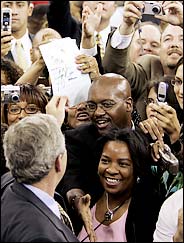Bush and Party Chief Court Black Voters at 2 Forums
 Jim Watson/Agence France-Presse - Getty ImagesPresident Bush returned a flier Thusday after signing it as he greeted participants at the Indiana Black Expo in Indianapolis. The president spoke to business leaders in a push to get more blacks to vote for Republicans.
Jim Watson/Agence France-Presse - Getty ImagesPresident Bush returned a flier Thusday after signing it as he greeted participants at the Indiana Black Expo in Indianapolis. The president spoke to business leaders in a push to get more blacks to vote for Republicans.New York Times
By ANNE E. KORNBLUT
INDIANAPOLIS, July 14 - In a coordinated effort to reach black voters, President Bush heralded higher test scores among minorities on Thursday while his party's chairman, in an even more explicit overture, apologized for past Republican efforts to exploit racial friction.
Mr. Bush spoke to business leaders at the Indiana Black Expo here, after declining an invitation to appear at the national convention of the National Association for the Advancement of Colored People for the fifth consecutive year because of what White House officials said was a scheduling conflict. "We're making big differences in the lives of African-Americans," the president told leaders at the expo.
Ken Mehlman, chairman of the Republican National Committee, spoke at the N.A.A.C.P.'s convention in Milwaukee. In his most extensive comments yet on the subject of race, Mr. Mehlman apologized for the so-called Southern strategy that his party employed nearly a half-century ago, when Republicans used the hostility of the civil rights era to pit Southern conservatives against blacks.
"Some Republicans gave up on winning the African-American vote, looking the other way or trying to benefit politically from racial polarization," he said. "I am here today as the Republican chairman to tell you we were wrong."
Mr. Mehlman, who has been energetically courting black voters since taking over as chairman of the party earlier this year, also argued that blacks should demand more from politicians and not automatically deliver their votes to the Democrats.
"If my party benefited from racial polarization in the past, it is the Democratic Party that benefits from it today," he said. "I know it is not in my interest as chairman of the Republican Party for close to 90 percent of African-Americans to vote for the Democrat every election. But more important, it's not in the interest of African-Americans for 90 percent to vote for the Democrat every election."
Mr. Bush tried to chip away at black support for Democrats in the 2000 election and again in 2004, enlisting backing from black religious leaders and emphasizing issues like same-sex marriage that are considered popular among minority voting blocs. Although Mr. Bush won only 11 percent of the black vote nationwide in 2004, hardly denting support for his Democratic rival, strategists in both parties agreed that he made progress in states like Ohio.
There has been significant tension between Mr. Bush and black voters, beginning with his first campaign for president, when the N.A.A.C.P. ran negative advertisements about him and blacks in Florida argued that they were disenfranchised during the voting process. In the 2004 election cycle, the Internal Revenue Service began investigating the group's leader, Julian Bond, to see whether his criticism of the president violated laws requiring tax-exempt groups to remain nonpartisan.
Mr. Bush has already been given a public invitation to attend next year's N.A.A.C.P. convention, giving him ample opportunity to avoid the scheduling conflict that administration officials said interfered this year. But the White House spokesman, Scott McClellan, said Thursday, "I think it's way too early to look at next year's schedule."
Mr. McClellan said the president wholeheartedly embraced all aspects of Mr. Mehlman's message. In his speech, Mr. Bush said that through home ownership, improved education standards, small-business operations and greater integration of religion-based initiatives in civic life, blacks were seeing improvements in their lives.
The president's appearance took place in the Seventh Congressional District, one of the most heavily minority areas of the state and one that is more Democratic than much of the rest of Indiana. Representative Julia Carson, a black Democrat who represents the district, joined Mr. Bush on Air Force One for the trip.



0 Comments:
Post a Comment
<< Home